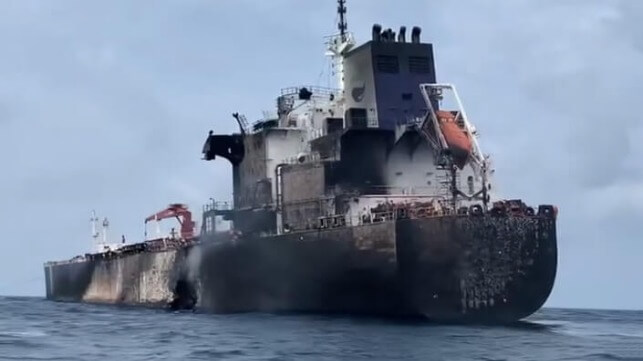Offloading of Hafnia Nile Underway 35 Days After Incident with Chinese VLCC

The offloading of the naphtha cargo that was aboard the Hafnia Nile when the vessel made contact with the VLCC Ceres I in Malaysian waters approximately five weeks ago is underway. The investigation into the incident also continues being led by Malaysian authorities and monitored by Singapore as the flag state of the product tanker.
A portion of the cargo which was owned by Cespa and bound for Japan survived the accident according to a report from S&P Global. They are quoting sources that said the offloading would be completed in the next few days with the support of the Malaysian authorities. An unnamed tanker has been positioned to receive the naphtha with S&P reporting that the vessel’s owners, Hafnia, are expected to provide an update in the coming days.
The Hafnia Nile was underway near the eastern side of the Singapore Strait when it made contact with the VLCC crude oil tanker Ceres I registered in São Tomé and Príncipe. According to S&P Global, investigators are continuing to explore it as an allision in which the Hafnia Nile struck Ceres I, which was believed to be at anchor. Among the points to be explored, however, is if the vessel was broadcasting an accurate AIS signal and was at anchor as alleged.
A fire ensued aboard both vessels and the Hafnia Nile was abandoned by its crew. A portion of the crew of the Ceres I also left the vessel while others remained behind to assist in the firefight. The fires were extinguished with significant damage to the Hafnia vessel but limited pollution.
The mystery deepened when the Ceres I which was reported to be part of the shadow fleet was missing the following day from the collision scene. Malaysian authorities initially accused the vessel of fleeing but later said the tanker might have drifted because it was without power and initially only being assisted by two smaller tugs. The VLCC was located and directed into an anchorage east of the Malaysian peninsular where it remains.

that matters most
Get the latest maritime news delivered to your inbox daily.
Reports traced the Ceres I to the Iranian oil trade. It was initially feared it was still laden but images confirmed that it only had ballast when it was struck on July 19. TankerTrackers.com and the NGO UANI both linked the vessel to the operations hiding Iranian oil and reported that it was in a known area used for illicit ship-to-ship transfers. The vessel is also reported to have a history of falsifying its AIS signal location and going dark. Ownership also remains clouded with it being registered likely to a shell company in Hong Kong that has not provided statements since the incident.
It is expected that the Hafnia Nile after the offloading will be permitted to proceed to a shipyard for repairs.
